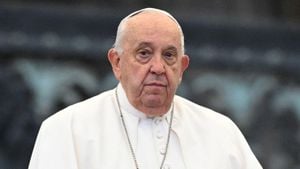The geopolitical chessboard is shifting as discussions about Russia's potential surrender of occupied territories intensify, spurred by Western negotiations and the possible involvement of American companies. Recent reports suggest the Kremlin is crafting narratives to erode trust between Ukraine and the United States, complicity steeped within the backdrop of strategic dialogues.
According to the Institute for the Study of War, Russian state media has been directed to amplify narratives aimed at creating discord within Ukrainian society and discrediting the country among its Western allies. This strategy coincides with the looming third anniversary of Russia's full-scale invasion of Ukraine, targeted for February 24, 2025, when Russian officials may publicly declare 'victory.' The urgency to depict this narrative raises alarms among Ukrainian and Western officials alike.
On another front, the Wall Street Journal revealed through various sources, including discussions held recently in Riyadh, how Russia could potentially offer American firms rights to extract valuable resources from Ukraine’s occupied territories as part of a peace agreement. The proposal includes stopping collaboration with China on advantageous terms for Russia and curtailing the role of Beijing in strategic infrastructure projects, yet, analysts caution against the viability of Russia achieving significant leverage to weaken ties with China.
The recent U.S. administration's apparent shift away from labeling Russia as the aggressor has provoked concern among European officials. The Telegraph reported on the Biden administration’s reluctance to characterize Moscow's actions as aggression during global meetings, including discussions about creating precedents for international prosecution of Russia's leadership, echoing sentiments from World War II's Nuremberg Trials.
One official noted, "If they do not recognize it as aggression, they cannot participate," reflecting the rising tensions within diplomatic corridors. This reluctance poses questions about Washington’s commitment to Ukraine’s territorial integrity, which was once strongly vocalized under the previous administration.
Adding to these fears, European diplomats criticized the current U.S. narrative shift, expressing outrage at suggestions to welcome back Russia to the 'civilized world.' A European diplomat articulated, "This is quite a radical change. To rewrite history and act as if Russia did not start this war is something we just cannot and will not agree to." Such declarations resonate beyond diplomatic circles, reinforcing longstanding sentiments on historical accountability.
This evolution of discourse carries weight as the U.S. debates its foreign policy approach. Former President Donald Trump’s reported inclination to negotiate with Russia may dilute previous alliances battered by the invasion's repercussions. Trump's frame suggests ordinary engagement is possible without adequately addressing the ramifications of Putin's aggression.
Russia’s perspective appears dual-faceted: it positions itself as seeking peace through negotiations but simultaneously attempts to solidify narratives of success. These efforts aim to cement any potential outcomes favorably portraying Russia, potentially undermining global support for Ukraine and convoluting future military assistance.
While speculation abounds about the U.S.-Russia discussions, the need to balance American interests with the realities on the ground remains clear. The role of American companies, potentially granted extraction rights, may steady domestic economic presences, yet could also enmesh the U.S. more deeply within Ukraine’s complex conflict zone.
The truth is during changing global dynamics, alliances can reshape rapidly. Upcoming negotiations not only test the resolve of current leadership but also serve as bellwethers for broader global interactions and the future of international law as it pertains to acts of aggression.
Observers remain cautious, as the outcome of these negotiations could forever alter the European security structure and the fabric of U.S.-Ukraine relations. The need for transparency, accountability, and steadfast support for international norms springs to the forefront as the world watches this precarious balancing act.
Anticipation builds for the scheduled meetings involving Ukraine’s leadership and U.S. representatives, with the hope of reaffirming commitments to uphold territorial integrity and outline red lines which must not be crossed amid precarious negotiations.



